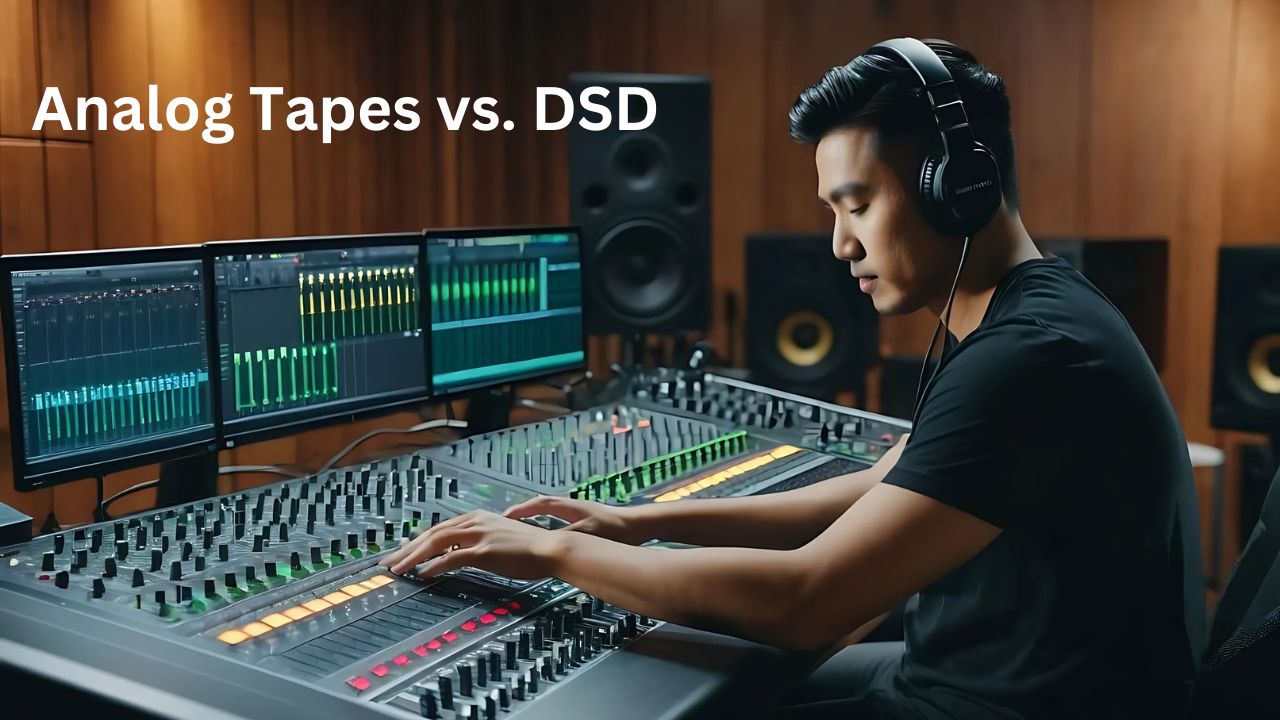The quest for the ultimate sonic experience is relentless. From the humble beginnings of analog tapes to the digital revolution, each format has brought its promises and limitations. But what truly reigns supreme in the realm of audio fidelity? Let’s delve into the age-old debate, analog tapes vs. DSD, and uncover the nuances that define our auditory pleasure!
Analog vs. Digital: A Tale of Trade-offs
For decades, analog tapes reigned as the epitome of audio recording technology. The warmth, depth, and character they imparted to music were unparalleled. Yet, beneath their nostalgic charm lay inherent flaws – tape noise, limited dynamic range, and frequency response constraints.
Despite these shortcomings, analog recordings held a special place in the hearts of audiophiles, embodying a raw, organic quality that digital formats struggled to replicate.
Then came the digital era, promising pristine sound reproduction with unparalleled fidelity. However, early digital recordings often fell short of expectations, plagued by a clinical, sterile quality that left listeners yearning for the soulful warmth of analog. The introduction of CDs marked a significant milestone, yet their sound left much to be desired, lacking the richness and nuance of their analog counterparts.
Enter DSD: The Holy Grail of Audio Fidelity
Amidst the digital disillusionment, a beacon of hope emerged in the form of Direct Stream Digital (DSD). Developed by Sony and Philips, DSD promised to revolutionize the audio landscape with its unparalleled clarity and realism. Unlike traditional PCM (Pulse Code Modulation) formats, DSD captured sound in a different paradigm, mirroring the waveform with remarkable accuracy.
The switch to DSD proved transformative for recording studios, where every nuance of the music is faithfully preserved. Microphone recordings rendered in DSD mirror the live performance with uncanny precision, capturing the subtle nuances and dynamics that define musical expression. Gone are the days of generational loss and sonic degradation – with DSD, each copy retains the pristine quality of the original, offering a true replication of the artist’s vision.
A Symphony of Clarity
The superiority of DSD is evident when compared to PCM recordings, as witnessed by industry veterans. While PCM may have its merits, its fidelity pales in comparison to the purity of DSD. In the hallowed halls of recording studios, where every note is sacred, DSD reigns supreme, offering a sonic purity that transcends the boundaries of conventional recording.
In Conclusion: Analog Tapes vs. DSD
In the perennial quest for audio perfection, DSD emerges as the undisputed champion, combining the best of analog warmth with digital precision. As technology continues to evolve, one thing remains certain – the pursuit of sonic excellence knows no bounds. Whether through the crackle of analog tapes or the pristine clarity of DSD, the essence of music endures, captivating hearts and minds alike with its timeless allure.
Elevate Your Audio Experience with Online Convert
Transforming your digital audio files has never been easier than with Online Convert’s suite of audio conversion tools. Whether you’re a music aficionado, podcaster, or content creator, our platform offers a seamless solution to tailor your audio to your exact preferences!
Simplicity Meets Power
Online Convert prides itself on its user-friendly interface, making it easy for you to convert your audio files into over 50 different formats with just a few clicks. Are you’re looking to compress files for quick sharing or maintain top-notch quality with lossless formats like FLAC? We’ve got you covered!
Give It a Go!
Join the millions of users who trust Online Convert to deliver unparalleled quality and reliability. Our audio conversion tools make it effortless to convert your audio files, as well as any other file types you may have!
Try Online Convert today and discover the difference for yourself!

